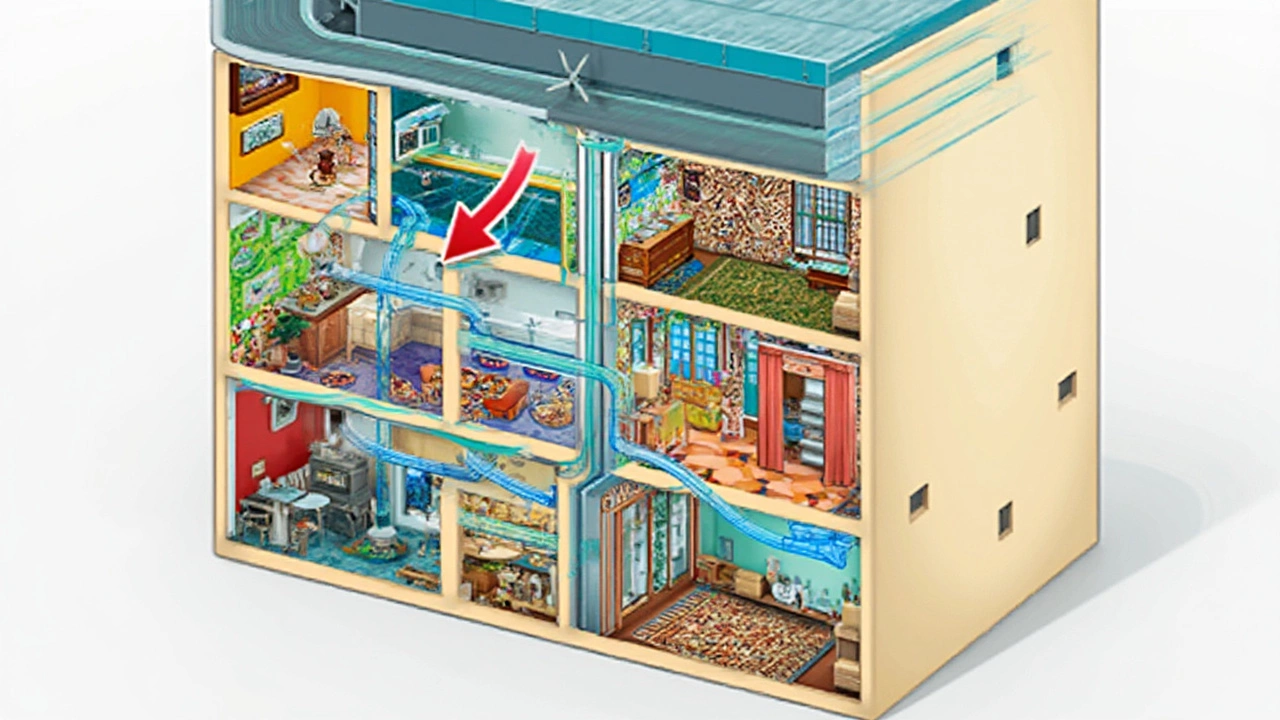 Feb, 5 2025
Feb, 5 2025
Air filters might not be the most glamorous part of your home, but they quietly do the hard work of keeping the air you breathe clean and your HVAC system running smoothly. So, how often should you change them? Well, it depends on a few factors.
First things first, if you've got pets, brace yourself for more frequent filter change-outs. Think every couple of months. Fluffy and Fido, adorable as they are, shed like it's their job, clogging up those filters faster than homes without pets.
Now, for the allergy sufferers out there, it's worth your while to swap filters every month, especially in peak pollen seasons. Trust me, your sinuses will thank you. But if you're lucky enough to have no pets or allergies, every 90 days might do the trick.
But what about those massive dust bunnies under the couch? If you're vacuuming them up every week, you might need to adjust your routine a bit. So, dive into your filter habits with an honest look at your living space, and adjust accordingly. Spending a few bucks every so often on a new filter isn't just about clean air, it could also trim down your energy bills. Who doesn't love saving money while breathing easier?
- Why Change Air Filters?
- Factors Affecting Replacement Frequency
- Signs Your Filter Needs Changing
- Tips for Extending Filter Life
- Impact on Energy Bills and Health
Why Change Air Filters?
Swapping out your air filters might feel like a chore, but it's one of those little things that makes a big difference. The primary role of an air filter is to trap dust, pollen, and other airborne particles. Without it, all that gunk would be circulating through your home, and let's be honest, no one wants that.
Improve Indoor Air Quality
Clean air is crucial, especially if you or anyone in your household has allergies or asthma. Keeping your air filters fresh ensures they keep capturing dust and allergens before they get a chance to irritate noses and lungs. Some studies suggest that regular filter changes can reduce allergen presence significantly, meaning you'll breathe easier without reaching for a box of tissues every five minutes.
Boost HVAC Efficiency
Your HVAC system works hard year-round. A clogged filter forces it to work even harder, which is not great for your energy bills or the lifespan of the system. Clean filters help maintain efficient airflow, preventing the system from overworking. On average, replacing filters regularly can lower energy costs by 5-15%. That's money right back in your pocket!
Prevent System Failures
Regularly replacing air filters isn't just about keeping the air clean—it's about protecting your HVAC system. Blocked filters can lead to overheating and even damage the system. An ounce of prevention, as they say, is worth a pound of repair bills!
Signs You've Waited Too Long
- Your energy bills are creeping up without obvious reasons.
- You're constantly dusting surfaces that seem dusty again too quickly.
- The family sniffer seems on edge with allergies more than usual.
Tackling these issues is as easy as checking your filters. If they look clogged or dirty, it’s time for a change. Doing so not only ensures cleaner air but also a longer-lasting HVAC system that doesn’t drain your resources. So next time you get to shopping for home essentials, toss a couple of air filters in your cart. You'll be doing your home, and yourself, a favor.
Factors Affecting Replacement Frequency
So, what exactly determines how often you should replace those air filters? It's a bit of a mix, really, and it all boils down to your specific living situation.
Household Size
If you've got a full house with family members coming and going, you're stirring up a lot of dust and allergens every day. This means those filters are working overtime, and you might want to check and change them more frequently—say, every 60 days.
Pets in the Home
As mentioned earlier, pets are a major factor. Filter replacement is definitely more frequent if you have furry friends. Their dander and hair find their way into everything, especially your HVAC system.
Allergies and Health Concerns
If anyone in your household struggles with allergies or respiratory issues, you should consider changing filters more often. Clean air can make a world of difference for those with sensitivities, and a new filter every month is a small price to pay for relief.
Local Air Quality
Don't forget the outside. If you live in an area with poor air quality or during high-pollen seasons, your filters will clog up more quickly. Urban areas with lots of traffic or industrial regions contribute to this, calling for a more diligent filter swap schedule.
Filter Type
Lastly, consider the type of filter you’re using. Basic fiberglass filters are cheaper but need replacing more often—every 30 days usually—while pleated ones last longer, around 90 days. High-efficiency filters or HEPA filters, though pricier, catch more and can sometimes stretch to 6 months, depending on usage.
Got an extensive duct system or running your HVAC non-stop? These, too, will require more frequent checks and possible replacements. Keeping an eye on these factors will help preserve that breath of fresh air in your home.

Signs Your Filter Needs Changing
It can be pretty easy to overlook your air filters, but ignoring them might cost you in the long run. So, how do you know it's time for a change? Let's walk through some telltale signs.
Uncomfortable Dust and Dirt Levels
If you notice dust piling up a lot faster than usual on your furniture (or if you're having to break out the feather duster more often than you'd like), it's probably your air filters crying for help. They might be too clogged to trap those pesky particles.
Allergy Flare-Ups
Feeling stuffy or sneezing like you just stepped into a flower shop? Recurring allergy symptoms can be linked directly to dirty air, meaning your filter is past its prime.
Unusual HVAC Behavior
Is your heating or cooling system acting like it's confused about the season? Poor performance can often be traced back to a clogged air filter. Strange noises or longer running times are red flags needing attention.
“Replacing clogged filters can lower your air conditioner's energy consumption by 5% to 15%.”
Visual Inspection
Pull out that filter and take a peek. If it looks more like a dusty artifact than something meant to clean your air, it's time to pop in a fresh one. A dirty filter turns a shade you can't clean off, like a forgotten dust rag at the bottom of the closet.
Things to Keep an Eye On
- Air Quality: Measurable decline can indicate a need for change.
- Filter Color: Off-white turning to gray or dark brown.
- Static Pressure: Rattling and inconsistent air flow.
Don't ignore these signals. Keeping tabs on your air filters won't just make your home feel fresher; it can also save you from bigger issues down the line. Who doesn't appreciate cleaner air and lower bills?
Tips for Extending Filter Life
Looking to get the most out of your air filters? Let's talk about how to keep them chugging along for as long as possible.
1. Regular Cleaning
Some filters can be gently vacuumed or washed to help extend their life. Make sure to check if your specific filter type allows this. Doing a little maintenance can delay the next trip to the hardware store, saving those extra bucks.
2. Maintain a Dust-Free Environment
Frequent cleaning of your living space, especially those corners that love to collect dust, can reduce the dirt load on your air filters. Use a vacuum with a HEPA filter for best results.
Create a Cleaning Schedule
- Dust surfaces weekly.
- Vacuum carpets and rugs bi-weekly.
- Mop floors regularly.
3. Manage Pet Fur and Dander
If pets are part of your family, grooming them regularly can significantly cut down on fur and dander, preserving your air filter's life. A thoughtful grooming routine can make a huge difference.
4. Use High-Quality Filters
Invest in high-quality filters that are specifically designed to last longer. They may cost a bit more upfront, but given they endure more, you'll come out ahead in the long run.
5. Control Indoor Humidity Levels
Using a dehumidifier or ensuring proper ventilation can prevent mold and mildew, which means your filters won't get overworked trying to filter out these nasties.
It's also worth mentioning that an efficient HVAC maintenance routine does wonders not just for your filter replacement schedule but for your whole system's efficiency. So, don't overlook professional check-ups now and then.

Impact on Energy Bills and Health
Ever noticed how your energy bills seem to have a mind of their own, climbing higher for no apparent reason? An old air filter might be the sneaky culprit. A clogged filter forces your HVAC system to work extra hard just to maintain the same temperature. It’s like trying to run a marathon with a backpack full of bricks. Not fun, right?
When systems have to push harder, they gulp more energy—meaning your bills can skyrocket. According to the Department of Energy, replacing a dirty, clogged filter can lower your air conditioner's energy consumption by 5-15%. Imagine what you could do with that extra cash!
Now, onto the health bit. Dirty filters mean poor air quality, spewing dust and allergens right back into your home. That’s a big no-no, especially for folks with allergies or asthma. Fresh filters help keep your air fresh and your lungs happy!
Why Regular Filter Changes Matter for Health
Air filters trap all sorts of nasties—dust, mold spores, pollen, and pet dander. With a clean filter, you can reduce these impurities, leading to fewer allergy and asthma symptoms. It's like giving your lungs a much-needed break.
So, switching out that filter isn't just a good housekeeping move—it's an investment in your health and wallet. Whether it's the winter chill or summer heat, keep those filters fresh, and you'll breathe easy knowing you're supporting the well-being of both your home and family.